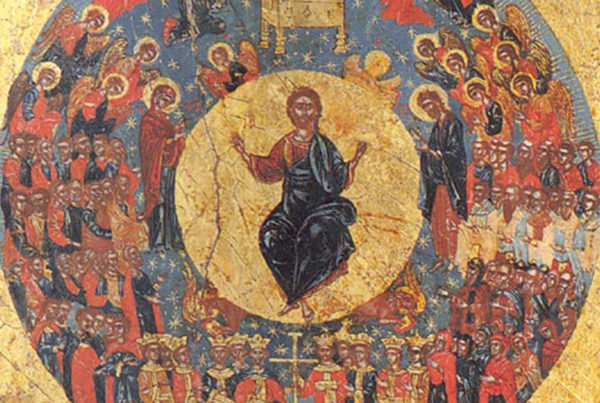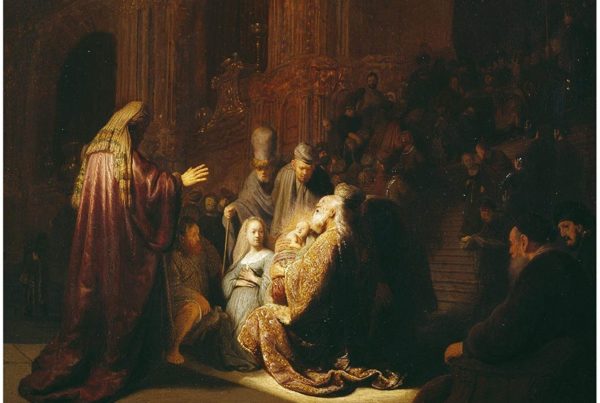I first became aware of the late Robert W. Jenson more than a decade ago when a friend of mine related to me this quote of his (which I have used often):
“God is whoever raised Jesus from the dead, having before raised Israel from Egypt…” (ST 1, p. 63)
Something about the quote rang true in my ears. I loved it and love it still for the pithy way it located the identity of God in the actual story of Scripture, rather than in some or another bit of speculative theology.
I was not, however, prepared for how thoroughly a deep encounter with Jenson’s work would impact me. Back in 2016, during my sabbatical, I decided to take the plunge and read through Jenson’s two-volume systematic theology: The Triune God (vol. 1) and The Works of God (vol. 2). His work strengthened my understanding of what was actually at stake in the great dogmatic traditions of the Church. For Jenson, they are, at their core, attempts to say:
“To be saying the gospel, let us say ‘F’ (rather than ‘G’)…” (Ibid., pp. 16-17)
Which of course is a way of saying that theology is that which stipulates the rules of Christian grammar. It helps us tell the story of Israel and Jesus straight. Thus, for Jenson:
“‘The doctrine of the Trinity’ is less a homogenous body of propositions than it is a task: that of the church’s continuing effort to recognize and adhere to the biblical God’s hypostatic being” (Ibid., p. 90).
Theology, in other words, drives us back to the Story, helping us to name rightly the God identified in the twists and turns, triumphs and missteps, of the biblical narrative. And, mutatis mutandis, Jenson wants us to understand that the biblical story is utterly decisive in our understanding of the identity of this God. Following Barth, Jenson is emphatic: God has chosen to identify himself by this particular story and no other. So all God-talk must be anchored in whatever it is has happened with Israel and Jesus, which the canon of Scripture bears witness to. Thus the famed quote: God is whoever raised Jesus from the dead…
It should be obvious to anyone who knows both Jenson’s work and my own ministry the debt I have already come to owe him, even in so short a time. I personally think that he is both one of the most important and, at the same time, one of the most under-appreciated American theologians of the 20th century.
But that may be soon to change. Interest in Jenson appears to be growing somewhat, and I think that interest can and will be aided by a wonderful little book written by my friend Chris Green: The End Is Music: A Companion to Robert W. Jenson’s Theology.
Chris was a personal friend of Jenson’s in his later years and writes both from his detailed knowledge of Jenson’s work as well as from his more textured and intimate experience of friendship with the man himself. I can think of few people better positioned to write this book, and the final product is remarkable, for many reasons, not least its blend of accuracy, depth, and accessibility.
For the novitiate, Jenson can be challenging. The pattern of this thinking and speaking take a bit of getting used to. And that is part of the point, for Jenson is trying to teach us a new language. To be saying the gospel… His work is just that: an attempt to say the gospel.
Green’s book is as good an overview and introduction to Jenson as, I think, we could hope to see. The six chapters of The End is Music cover six broad themes which are definitive, ubiquitous, and unavoidably interwoven in Jenson’s work, and create a truly helpful onramp into that work. Get the patterns present in these themes right, and you’ll be well on your way to learning how to “speak Jenson.” Those themes are:
- God: Identification and Event
- Truth: Method and Meaning
- Creation: Being as Communion
- Salvation: Story and Promise
- Church: Anticipation and Availability
- Kingdom: The End as Music
I want to make a few comments on each, hopefully to whet your appetite a bit (both for Green and Jenson). Here we go…
1) GOD
God, as we’ve already said, is identified by the events so outlined in the biblical story. “If, then, we hope to speak the same gospel that the apostles and prophets spoke, if we hope to identify for ourselves and for others the God the canonical Scriptures specify, then we must let the story of what happened with Israel and with Jesus, as Israel-in-person, determine our claims from first to last” (The End is Music, p. 15–all quotes from here out will be from the same).
Saying “Father, Son, and Holy Spirit” then is a way to speak faithfully about what is going on in this story–the story of how God is with us in Jesus. It is not a way of getting “behind” the story to something more fundamental–which is what a good deal of theology, both conservative and liberal, tends to do. No, God has freely chosen to be the God he is in this particular history with us. To use Pauline language, we know both God and ourselves “in Christ”–a sort of shorthand summary for all that God has revealed of himself and accomplished for us in Jesus of Nazareth.
2) TRUTH
Unsurprisingly, then, Truth is not a reality higher than God himself, for–and here Jenson appropriates Thomas Aquinas–God is truth, and therefore truth (wait for it…!) has an inherently “dramatic” shape, for, once again, God has chosen to identify himself by this particular story, by the events of the biblical narrative. And insofar as God is personal, the truth is personal; insofar as God is “event-ed,” truth is an “event.”
Writes Jenson, “the truth is God-revealing-himself, God-present-to-me, deus loquens. Truth, that is, occurs. It occurs when God interrupts my flight from him and places himself in my way as the unavoidably decisive pole of my life. Truth is Jesus” (Green quoting Jenson, p. 41).
What does this interruption look like? Green writes, “The truth must happen to us. And it must happen in ways that free us to interact, to respond, to engage with God and with one another. And because God is the truth, the truth happens only as God happens: ‘grace’ is just another way of naming the activity of the Spirit in our lives” (p. 43).
The “occurring” of God, who is the Truth, to us, liberates us for the genuine knowledge and love of God and neighbor.
3) CREATION
But how, characteristically, does that “occurring” of God happen to us? By speech. And so we come to Jenson’s account of Creation. God, as the Scripture would have it, speaks Creation into being out of the boundlessness of the Triune converse, which is communion. Or even better: “Because God is a communion, a lively and dramatic conversation, it is, Jenson contends, ‘sort of natural’ (but only sort of!) that God creates. In a word, then, we are made for communion with God by the communion of God, and we exist just as God makes time for us and we take time for him. This is the heart of Jenson’s doctrine of creation” (p. 52).
To put it in an even more characteristically Jensonian way: “God creates by taking time within his eternal time for others than the three who are himself” (ibid). Good golly. Created time, according to Jenson, is God opening up space within the Triune converse for genuine “others,” who find their life in and only in their joyful and obedient participation in that converse.
4) SALVATION
That leads us to Salvation. “Jenson’s doctrine of creation,” Green writes, “anticipates both his soteriology and his eschatology: if at first, before the beginning, there was only God and nothing, then at last, after the end, creation must find its fulfillment in God or its dissolution in nothingness.” Creation will rise up into a joyful and obedient participation in the Triune converse, or it will fall into nonbeing. Such participation is its salvation.
“For creation to find that fulfillment in God it must be transfigured, made apt for that fulfillment. And this is precisely what God has brought about in Jesus for us” (p. 72-73). Even more tersely, Green reminds us of Jenson’s axiom that the gospel is “the story about Jesus, told as a promise” (p 74).
And just what does it promise? “It promises, no matter what has happened and no matter your present state, the future is now open for your good” (p. 75). It is so “because Christ has passed through death, and now lives and loves with death behind him” with the result that “we can live boldly” (p. 80), the spectre of death having been abolished in the body of the Lord.
5) CHURCH
What is the Church, then? We might be able to anticipate this move, if we’ve been following the train of thought so far: “The church, as Jenson regards it, is an anticipation of the kingdom, a kind of prefiguration of the age to come, an embodiment now of the promise that is not yet realized for all creation” (p. 83–emphasis mine).
A direct implication of this is that (and this is, to me, one of the most compelling logical conclusions of Jenson’s thought) “the church is the availability of Christ to the world, and the church’s ministries mark the nexus of time and eternity, earth and heaven, past and future, where God is personally encountered by those he graciously draws to himself in faith” (ibid.–emphasis mine).
Jenson draws heavily on Augustine’s idea of the totus Christus; that is, the “total Christ” is Jesus-with-his-people. The church is the “bride of Christ,” joined in union to him–a union that will be perfectly completed at the eschaton. Until then, the church is “spurred on, wooed toward the fullness of Christ’s stature as the perfection of all things” (p. 85).
The church maintains her identity, life, and message by her sacraments:
- baptism, which creates the church,
- eucharist, which constitutes the church ever-anew as the fellowship of the kingdom,
- ordination, which “centers the Christian community in its continuity with the apostles and its fidelity to the message entrusted to its care” (p. 89), and
- preaching, which “is a word-event that makes the gospel happen for speaker and hearers alike” (p. 90).
6) KINGDOM
In all of her ministrations, the church bears witness to the coming Kingdom of God–the eschaton, the “end.” What is the Kingdom, and how does it come? “It comes,” Green writes, “as a manifestation, judgment, reconciliation, fulfillment, and bliss: all of these at once, and each because of the others. And this manifold end can come about only by a divine work that effects creation’s translation into God’s own life” (p. 93).
The coming of Christ in glory is a “manifestation” in that it is a moment that happens to time which draws “all moments, all events…into the light of the divine glory where they truly are what they are” (ibid.).
It is a “judgment” in that it is not “merely a reckoning for wrongs done” but a “generative event…in which…God consummates what he has already initiated in Israel and the church” (p. 94).
It is a “reconciliation” in that the justice and holiness of God are perfectly satisfied, setting all things back into their God-intended relatedness.
It is a “fulfillment” in that we “share in his judgment in the glorious end of all things” (p. 95).
And it is “bliss” in that we, the saints, will be brought to a state of “seeing God and all things in God” (p. 96).
Every discord and breakdown of communion between ourselves, God, and others, wrought by sin will have been overcome, with the result that “in the end, God will truly, fully surround us, as a space that has no exterior. And in enveloping us as beginning, guide, and end, God will fulfill us just as he himself is all in all. The end is music–a music that does not end, and so is always our beginning” (p. 100-101, emphasis mine). We, with all Creation, will be translated into the everlasting Music that is Father, Son, and Holy Spirit. This is our end.
Hopefully that gives you a taste of Jenson’s theology (via Green’s marvelous book!).
We live in a time that is demanding ever more faithful and creative articulations of the gospel. You won’t, I should say, likely agree with all that you read in Jenson. I don’t. (But then, I don’t agree with all of anything that anyone writes; and neither, likely, do you.) But you will certainly find your own language, your own capacity to “say” the story of how God has come to us in Jesus, strengthened and enriched by him. And so I encourage you to read him.
Thanks be to God for this indescribable gift!
Andrew



